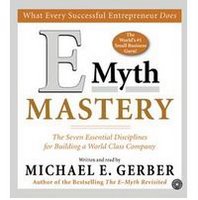
I was so, so very lucky to happen to run into the newest book from Michael Gerber last December, while browsing in a bookstore, entitled EMyth Mastery.
For anyone who is contemplating starting their own business, any of the EMyth books should be required reading as the author does an excellent job of describing what it takes to start a successful company for the long-term. The irony is that very few people truly understand what it means to be an entrepreneur, or what it is that entrepreneurs actually do on a daily basis.
Essentially, most people think that if you do something well, and enjoy doing it, that starting a business doing that thing is a natural next step that should be encouraged.
Knowing what I know now, after 13 years of running my own firm, I would discourage those who think that that is all that is required. Their ignorance will only hurt them.
What most people do NOT appreciate is that there is a distinction between working IN your company and working ON your company that I am only still grappling to appreciate.
Working IN your company means, in the simple example of a roti shop: making and selling rotis.
Working ON your company means setting up the operations processes, policies and turn-key applications that are basically required to make any company successful, and must be customized to make your own company viable over a period of years. For example, the roti vendor would have to develop a standard process, manual and teaching method to standardize the method of making rotis so that
- they are made the same way each time
- they can be taught and re-taught the same way
- they could one day form the basis for expansion
Case in point: it was Ray Kroc’s genius for building a viable, expandable business that turned the store he bought from the McDonalds’ brothers into a multi-billion dollar empire.
The big myth about starting a business is that, for example, it’s the quality of the rotis that will make the business succeed. While that’s important, it’s just not true. Instead, it’s the quality of the business itself (and how it is run) that is much, much more important.
I’ve spent the last month re-tooling my own company and writing manuals for doing just about everything that I think is important. The areas that I have created for Framework Consulting are:
- Enterprise Leadership
- Management
- Financial Leadership
- Client Fulfillment
- Lead Generation
- Lead Conversion
- Thought Leadership*
- Marketing
* this is one that I added to the standard set that Gerber recommends.
I had to do quite a bit of reworking of his original ideas to fit my kind of business, but his basic thinking is still the best advice around for small business owners



